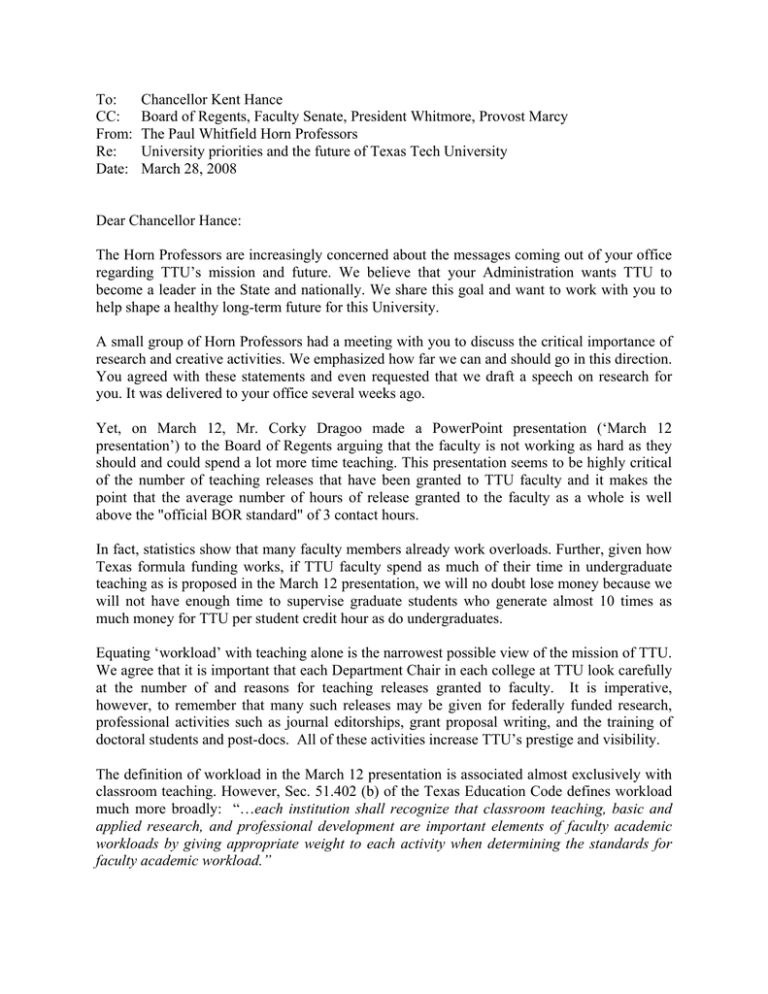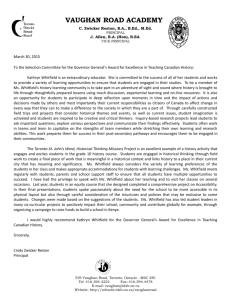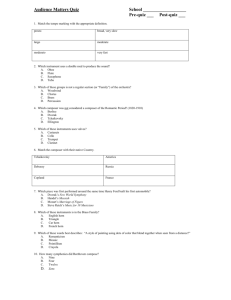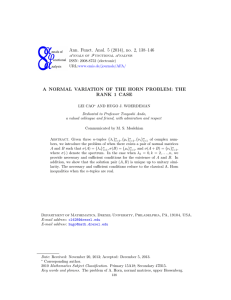To: Chancellor Kent Hance CC:
advertisement

To: CC: From: Re: Date: Chancellor Kent Hance Board of Regents, Faculty Senate, President Whitmore, Provost Marcy The Paul Whitfield Horn Professors University priorities and the future of Texas Tech University March 28, 2008 Dear Chancellor Hance: The Horn Professors are increasingly concerned about the messages coming out of your office regarding TTU’s mission and future. We believe that your Administration wants TTU to become a leader in the State and nationally. We share this goal and want to work with you to help shape a healthy long-term future for this University. A small group of Horn Professors had a meeting with you to discuss the critical importance of research and creative activities. We emphasized how far we can and should go in this direction. You agreed with these statements and even requested that we draft a speech on research for you. It was delivered to your office several weeks ago. Yet, on March 12, Mr. Corky Dragoo made a PowerPoint presentation (‘March 12 presentation’) to the Board of Regents arguing that the faculty is not working as hard as they should and could spend a lot more time teaching. This presentation seems to be highly critical of the number of teaching releases that have been granted to TTU faculty and it makes the point that the average number of hours of release granted to the faculty as a whole is well above the "official BOR standard" of 3 contact hours. In fact, statistics show that many faculty members already work overloads. Further, given how Texas formula funding works, if TTU faculty spend as much of their time in undergraduate teaching as is proposed in the March 12 presentation, we will no doubt lose money because we will not have enough time to supervise graduate students who generate almost 10 times as much money for TTU per student credit hour as do undergraduates. Equating ‘workload’ with teaching alone is the narrowest possible view of the mission of TTU. We agree that it is important that each Department Chair in each college at TTU look carefully at the number of and reasons for teaching releases granted to faculty. It is imperative, however, to remember that many such releases may be given for federally funded research, professional activities such as journal editorships, grant proposal writing, and the training of doctoral students and post-docs. All of these activities increase TTU’s prestige and visibility. The definition of workload in the March 12 presentation is associated almost exclusively with classroom teaching. However, Sec. 51.402 (b) of the Texas Education Code defines workload much more broadly: “…each institution shall recognize that classroom teaching, basic and applied research, and professional development are important elements of faculty academic workloads by giving appropriate weight to each activity when determining the standards for faculty academic workload.” Research-oriented Universities such as TAMU recognize the importance of research and creative activities. They allow relief from teaching for faculty active in these areas far above what TTU does (www.tamu.edu/opir/workload_policy.pdf). This is one of the key reasons for the growth of TAMU: high admission standards, investment in research (endowed chairs, startup funds, etc.). You made it clear that you are committed to increasing the enrollment at Texas Tech from 28,000 to 40,000 students over the next 12 years. While we generally support the concept of increasing the number of students, it is essential that such an increase involves the best undergraduate and especially graduate students. This implies raising admission standards, creating competitive scholarships, investing in research and scholarly activities. Instead, you seem to be committed to dramatic growth by making our costs very much lower than those of other institutions, causing students to flock to TTU because we will provide education at a "bargain basement" cost. Further, the arguments in the March 12 presentation show that the way you plan to accomplish this is to double (or in some cases perhaps come close to triple) faculty teaching loads so that we can educate more students without any increase in the faculty salary budget of the university. The March 12 presentation claims that over the past 6 years there has been a radical change in the average income of families of TTU undergraduates and that we have been losing middle class students. In fact, several distinguished economists to whom we have shown these data are extremely skeptical of this claim and of the methodology used to generate this result. To rush into a radical increase in faculty workloads based on what might be deeply flawed assumptions distresses us greatly. We are greatly concerned about what this increase in enrollment will do to the quality of our students. Just to keep our numbers from falling below 28,000 this year, TTU has been digging deeper into the barrel. The average SAT score for our most recent entering class is down by 12 points over the previous one. Letters of acceptance have now been sent to students who have been rejected earlier because of low academic performance. This is precisely the opposite of what TTU should be doing in order to ensure healthy long-term growth. We strongly feel that the implementation of even a portion of the strategy outlined on March 12 would be a real disaster. It would destroy any chance of increasing the reputation of TTU as a place where - beyond high quality teaching - research and creative activities are valued and considered to be an essential part of our mission. Leaving aside the obvious question of where the money would come from to construct new teaching lecture halls, labs and new dorms, and paying for increases in staff salaries, it is not at all clear that we can decrease costs by anywhere near enough to increase registration numbers by the 1,000 students per year needed to reach your goal by the target year of 2020. Another reason for concern is the conclusion in the March 12 presentation that our recent increase in faculty/student ratio is a bad thing. Many - including U.S. News and World Report in their annual rankings of undergraduate programs - would argue that this is a good thing. As many parents and students look at the U.S. News and World Report evaluations when looking at college choices, implementation of the March 12 strategy might actually hurt our efforts to grow the student population unless we sharply decrease the quality of our students. Saving the most important thing for last, we will state plainly that the plan outlined in the March 12 presentation will completely eliminate TTU as an institution with any research aspirations. Our best research-active faculty would leave (of course, those with the best chances for leaving are just the people we can least afford to lose) and no young prospective faculty interested in time to pursue research and scholarly/creative activities would ever consider coming to a place like TTU which would have them spend 2-3 times more time in the classroom than at any research university. We urge you not to go back 40 years to the days of Texas Technological College but instead to embrace a future for Texas Tech University as a place recognized not just for high-quality teaching but also for world-class research and scholarly activity. The Horn Professors request a meeting with you. We wish to discuss these issues and find out your strategies regarding the future of TTU. We feel that this matter is of critical importance. Each of us will make every effort to attend a meeting with you at your earliest convenience. With best regards, The Spokesperson of the Horn Professors David B. Knaff Paul Whitfield Horn Professor of Chemistry & Biochemistry The following Horn Professors have requested that their name be added to the list of signatures Vivien G. Allen Paul Whitfield Horn Professor of Plant & Soil Science Thornton Distinguished Chair in Plant & Soil Sciences Warren B. Ballard Paul Whitfield Horn Professor of Natural Resources Management William R. Casto Paul Whitfield Horn Professor of Law Sankar Chatterjee Paul Whitfield Horn Professor of Geosciences Curator of Paleontology William J. Conover Paul Whitfield Horn Professor of Business Administration Daniel E. Cooke Paul Whitfield Horn Professor of Computer Science Stefan K. Estreicher Paul Whitfield Horn Professor of Physics Hafid Gafaiti Paul Whitfield Horn Professor of Classical & Modern Languages & Literatures Qualia Professor of French Michael L. Galyean Paul Whitfield Horn Professor of Animal and Food Sciences Clyde A. Hendrick Paul Whitfield Horn Professor of Psychology Susan S. Hendrick Paul Whitfield Horn Professor of Psychology James G. Hunt Paul Whitfield Horn Professor of Business Administration Trinity Company Professor in Leadership Shelby D. Hunt Paul Whitfield Horn Professor of Marketing The Jerry S. Rawls Professor of Marketing Eileen G. Johnson Paul Whitfield Horn Professor of Museum Science Curator of Anthropology Director of Lubbock Lake Landmark Kenneth Laine Ketner Paul Whitfield Horn Professor Director, Institute for Studies in Pragmaticism Charles Sanders Peirce Interdisciplinary Professor (Humanities), School of Nursing Magne Kristiansen Paul Whitfield Horn Professor of Electrical Engineering C.B. Thornton Professor of Electrical Engineering Allan J. Kuethe Paul Whitfield Horn Professor of History David H.J. Larmour Paul Whitfield Horn Professor of Classical & Modern Languages & Literatures Clyde F. Martin Paul Whitfield Horn Professor of Mathematics & Statistics Ex-Students Association Distinguished Professor Gregory B. Mckenna Paul Whitfield Horn Professor of Chemical Engineering John R. Bradford Endowed Chair in Engineering Sunanda Mitra Paul Whitfield Horn Professor of Electrical Engineering W. David Nes Paul Whitfield Horn Professor of Chemistry & Biochemistry Janet Pérez Paul Whitfield Horn Professor of Romance Languages Qualia Chair of Spanish Frits Ruymgaart Paul Whitfield Horn Professor of Mathematics & Statistics Susan Saab-Fortney Paul Whitfield Horn Professor of Law George H. Mahon Professor of Law Henryk Temkin Paul Whitfield Horn Professor of Electrical Engineering Jack F Maddox Chair of Engineering James C. Watkins Paul Whitfield Horn Professor of Architecture William Westney Paul Whitfield Horn Professor of Music Browning Artist-in-Residence




